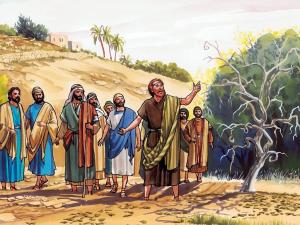Matthew 21:18-21 relates the story of Jesus cursing a fig tree because it had no fruit. This event is significant because it serves as a powerful illustration of the consequences of unfruitfulness and the importance of faith in God.
According to the passage, Jesus and his disciples were traveling to Jerusalem and were hungry. They came across a fig tree, but when they went to find fruit on it, they found none. In response, Jesus said to the tree, "Let no fruit grow on thee henceforward for ever" and the tree withered away.
This event has been interpreted in a few different ways. One interpretation is that the fig tree represents the Jewish religious leaders of the time, who were outwardly religious but did not have the spiritual fruit of righteousness. In this interpretation, Jesus' cursing of the tree is a condemnation of the hypocrisy and unfruitfulness of these leaders.
Another interpretation is that the fig tree represents the nation of Israel, which was also outwardly religious but did not have the spiritual fruit of righteousness. In this interpretation, Jesus' cursing of the tree is a warning to the nation that if they do not repent and bear fruit, they will be cut off.
A third interpretation is that the fig tree represents the individual believer. In this interpretation, the fig tree represents the believer who has the appearance of righteousness but does not have the spiritual fruit of righteousness. In this interpretation, Jesus' cursing of the tree is a warning to the believer that if they do not repent and bear fruit, they will be cut off.
Regardless of the interpretation, the main point of this passage is that God desires spiritual fruit from his people. This is reinforced by Jesus' statement in Matthew 21:43: "Therefore say I unto you, The kingdom of God shall be taken from you, and given to a nation bringing forth the fruits thereof". This passage teaches that God will remove those who are unfruitful and replace them with those who bear fruit.
Additionally, this passage also teaches the power of faith and the importance of faith in God. In Matthew 21:21, Jesus says "if ye have faith, and doubt not, ye shall not only do this which is done to the fig tree, but also if ye shall say unto this mountain, Be thou removed, and be thou cast into the sea; it shall be done". This passage teaches that faith in God can move mountains and that it is through faith that we can accomplish great things.
In conclusion, the story of Jesus cursing the fig tree in Matthew 21:18-21 serves as a powerful illustration of the consequences of unfruitfulness and the importance of faith in God. It teaches that God desires spiritual fruit from his people, and that those who are unfruitful will be removed and replaced with those who bear fruit. Additionally, it teaches the power of faith and the importance of faith in God.

ConversionConversion EmoticonEmoticon